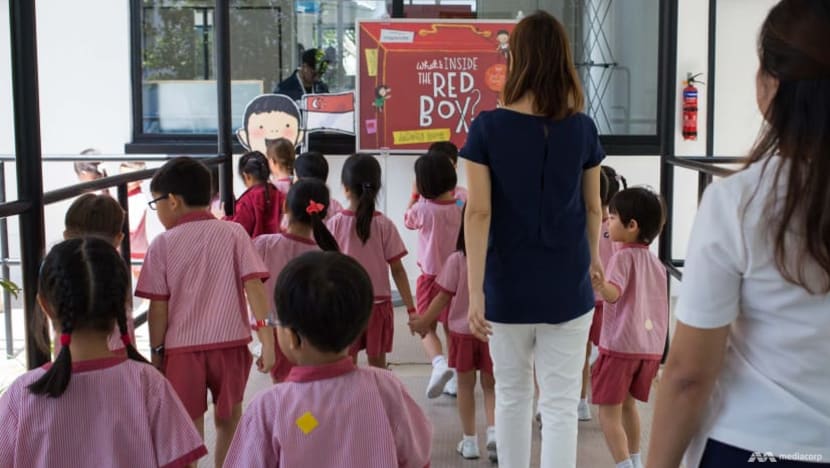KidSTART programme for children of lower-income families to expand nationwide

A preschool teacher with children. (File photo: TODAY)
SINGAPORE: A programme to help young children from lower-income families will be progressively expanded nationwide from next year, said the Ministry of Social and Family Services (MSF).
The KidSTART programme, first piloted in 2016, provides support to lower-income families with young children up to six years old. It has benefitted more than 3,000 children living in 13 Social Service Office regions and is on track to support 5,000 children by 2023.
“The Government is committed to strengthening support for children from low-income families, so we narrow the gap starting from their early years,” said Minister of State for Social and Family Services Sun Xueling on Thursday (Mar 10).
She was speaking at the MSF Committee of Supply debate, where the ministry announced new initiatives to raise the quality of early childhood professionals and programmes.
For children with developmental needs, there will be two new early intervention centres built, further expanding the number of places under the Early Intervention Programme for Infant and Children.
MORE PRE-SCHOOL PLACES
The Early Childhood Development Agency (ECDA) said that the proportion of pre-schoolers in Government-supported pre-schools has increased to more than 60 per cent, up from just over 50 per cent in 2018.
It has also more than doubled the number of full-day pre-school places in the past decade from 90,000 places in 2012 to around 200,000 places as of end-2021.
“We will develop about 10,000 more full-day places by 2023 to meet the growing demand for pre-school,” Ms Sun said, adding that these new places are concentrated in areas with young families.
By around 2025, eight in 10 pre-schoolers can have a place in Government-supported pre-schools, and fee caps will be lowered in the coming years, said Ms Sun.
To support the expansion of pre-school places, the number of early childhood educators in the sector has grown from 18,000 in 2018 to more than 23,000 in 2021.
To strengthen leadership competencies in the sector, ECDA will introduce a Leadership Development Framework for the “holistic development” of centre leaders.
It will also launch Early Childhood Learning Communities (ECLC) from April to foster peer sharing of pedagogical knowledge and practices across the sector.
This initiative will also allow outstanding educators to be identified and nurtured to become future curricular and pedagogical leaders, said ECDA. The ECLCs will cover four areas – Early Years Competencies, Outdoor Learning, Social and Emotional Development, and Language and Literacy.
Core members of the communities who lead peer sharing and learning sessions for exchange of best teaching practices among educators will have access to fully funded professional development programmes and a professional development grant in their second year.
In addition, an annual manpower relief fund will be available to their employers to defray manpower relief costs.
ECDA will also be reviewing the Early Years Development Framework for educators of children aged three and younger to include new areas such as the learning of Mother Tongue languages and creating an inclusive classroom environment.
The Government’s annual spending on the early childhood sector is expected to more than double over the next few years, from around S$1 billion in 2018, said MSF.















